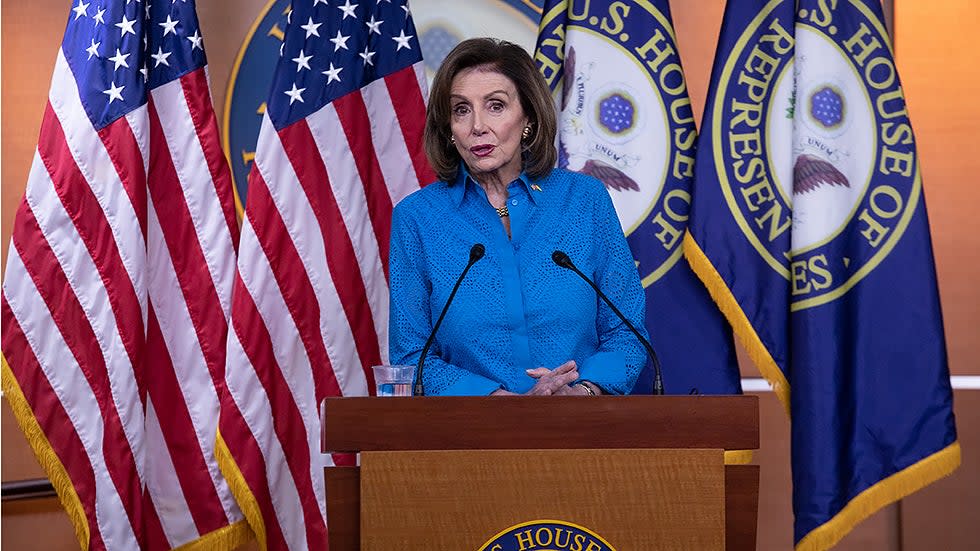Pelosi rejects Zelensky's calls to 'close the sky' over Ukraine

- Oops!Something went wrong.Please try again later.
- Oops!Something went wrong.Please try again later.
Speaker Nancy Pelosi (D-Calif.) on Thursday amplified her opposition to the idea of sending U.S. or NATO forces into Ukraine to help the embattled country repel Russian airstrikes.
A more direct Western intervention to create a no-fly zone over Ukraine has been the foremost request of Ukrainian President Volodymyr Zelensky as he scrambles to secure more international help amid mounting civilian casualties. Zelensky's latest plea came Wednesday, when he addressed Congress virtually and implored lawmakers to help his forces "close the sky."
The idea has been roundly rejected by President Biden and other Western leaders. Biden in particular has been quick to warn that such help would necessarily pit U.S. and NATO troops against Russian forces - and launch a third world war in the process.
It was that message of unity - and unified strategy - that Pelosi stressed on Thursday.
"They are all unified with how we go forward. And how they are unified on how we go forward is that we are not going into Ukraine," Pelosi said.
"It is not an Article 5 situation," she added, referring to the fact that Ukraine is not a member of NATO. "We are, however, prepared to supply Ukraine with very sophisticated equipment."
In Wednesday's speech, which Zelensky delivered virtually to hundreds of senators and House members assembled in a Capitol auditorium, the Ukrainian president pled with Congress and Biden to "do more" to help his country repel Russia's military forces.
His message sought to appeal to the American public, framing the conflict as a global fight between freedom and tyranny, good and evil.
"We're fighting for the values of Europe and the world," he said.
Zelensky returned again and again to the theme of the importance of establishing air superiority - or at least keeping Ukraine's airspace a contested battleground to prevent Russian forces from roaming freely. The theme emerged in his references to Pearl Harbor, "when your sky was black from the planes attacking you," and the terrorist attacks of 9/11, "when innocent people were attacked, attacked from air."
"Is this a lot to ask for, to create a no-fly zone over Ukraine to save people? Is this too much to ask, humanitarian no-fly zone, something that Russia would not be able to terrorize our free cities?" he asked lawmakers.
Even so, he also seemed to realize going in that the answer would be no. With that in mind, he offered a concession: "If this is too much to ask, we offer an alternative."
Zelensky then rattled off a series of weapon systems he said would help Ukrainian forces combat Russian aircraft, including anti-aircraft missiles - supplies Biden said would be granted in an announcement shortly after Zelensky's speech.
Pelosi, who spoke with Zelensky last week and has also spoken several times with her Ukrainian counterpart, said Zelensky's plea was perfectly appropriate. But Ukrainian leaders already "know" the limits of NATO's involvement, she added.
"What he wants is a result. He wants a result that says, ... 'If you are not going to give us air cover with your own personnel, we need air cover or we need equipment to affect air cover,'" Pelosi said.
"'If it's not going to be affected by what I'm asking for, then this is another way we can get that done.'"

